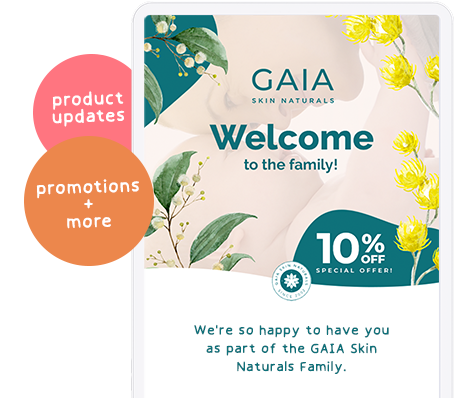Claims Glossary:
Understand the Labels and Benefits of Our Products
Especially when it comes to natural products. To save you the search, we’ve put together a glossary that explains commonly used terms to help you navigate your way:
-
Biodegradable
When something is biodegradable, it means that it can completely break down and be reabsorbed back into the earth within a short space of time – ideally less than one year. This is important because it saves landfill space and therefore helps the environment!
-
Cruelty-Free
Absolutely none of our products or the ingredients used within the products are tested on animals and all of our products are Cruelty-Free Accredited. Instead, they’re tested on real-life humans – with their permission, of course!
-
Compostable
Compostable products break down and return to nature when disposed of in specific conditions. They undergo a degradation process when exposed to living organisms such as bacteria, elevated temperatures and moisture. The difference between compostable products vs biodegradable products is that, as their name suggests, compostable items can be thrown into a compost environment.
-
Degradable
Degradable products break down in soil and landfill, however they do not require living organisms or bacteria to do so. Instead, they contain special chemicals that kickstart this breakdown process. Degradable products do not completely dissolve in nature, and they can leave behind microplastics that can end up in the food chain.
-
Eco-Friendly
This can be a really vague term, but when we use it we mean that whatever we are referencing is actively better for the planet than other less sustainable products.
-
Made Without
What doesn’t go into a product is just as important as what does go in them. We don’t use any ingredients that are known to cause skin irritation, dryness or are reactive to sensitive skin.
-
Hypoallergenic
Although it’s impossible to claim something will never cause any allergies, our products are designed to be hypoallergenic which means that they contain no known allergy-producing substances known as allergens.
-
Lanolin
Lanolin is known as wool wax or wool fat. It is a soft, yellow, waxy substance secreted by the sebaceous glands of sheep. Its purpose is to waterproof and protect the wool, and it’s a popular addition to cosmetic products due to its moisturising properties. We choose to leave out lanolin in our products as it can be laden with the pesticides of agriculture that contribute to allergies.
-
Mineral Oil
Mineral oil is a clear, odorless liquid and a common ingredient in a variety of cosmetics and personal care products. Mineral oil is made from highly refined and processed petrochemicals, it is a by-product of the fossil fuel industry. In cosmetics, Mineral oil helps keep skin hydrated by locking in moisture by forming a barrier on the skin’s surface. At GAIA, we choose to use sustainably sourced, bioavailable natural alternatives such as shea butter and sunflower seed oil that have additional anti-inflammatory and soothing benefits.
-
Natural Fragrance
All of our aromas and fragrances are only created from essential oils or natural sources such as botanical extracts. This means that they don’t use any synthetic chemicals so they’re perfect for sensitive skin.
-
Nature-Identical
These are synthetic ingredients created through reactive chemistry that have the same chemical structure of naturals, but do not come from botanicals.
-
Noncomedogenic
A fancy word for skincare products that do not cause comedones (or pore blockages). This is important as it allows the skin to breathe naturally, which is why GAIA chooses to leave out petrochemical based ingredients.
-
Non-Nano
In the EU, a nanomaterial is defined as “a natural, incidental or manufactured material containing particles, in an unbound state or as an aggregate or as an agglomerate and where, for 50% or more of the particles in the number size distribution, one or more external dimensions is in the size range 1 nanometer – 100 nanometer.” The concern with nanoparticles is that we don’t fully understand the health and environmental implications. Because of this, we choose to use non-nano ingredients.
-
Organic
We promise we don’t use organic as another meaningless buzzword. It means that, wherever possible, we use certified ingredients which are grown or made as naturally as possible, without the use of any chemical fertilisers, pesticides or other artificial chemicals.
-
Petrochemicals
Petrochemicals are chemical products obtained from petroleum through the process of refining. Petroleum derived ingredients are ‘occlusive’, meaning they seal off the skin from air, water or anything else getting in (or out). Wherever they’re applied, they form an invisible film on the surface that blocks the pores and the skin’s natural respiration process.
-
PH-Balanced
The pH of our skin and hair is very delicate and it’s important not to upset this perfect balance as it can cause dryness or irritation. This means that our products are completely compatible with the typical pH of our bodies.
-
Phthalates
These are a group of chemicals that have been linked to endocrine disruption, developmental and reproductive toxicity. They are banned from use in the European Union but remain prevalent in other markets. Look out for ingredients such as dibutyl phthalate (DBP) and Di-2-ethylhexylphthalate (DEHP) on cosmetic labels. Phthalates can also be found in synthetic fragrances, which is why GAIA products obtain their scent from natural essential oils.
-
Plant-Based/Plant-Derived
Plant-based doesn’t just mean that our products are suitable for vegans (although most of them are), it also means that each ingredient has come from a renewable and natural source: plants!
-
Soap-free
Soap has a significant disrupting effect on the skin’s barrier function due to the drying effects it has on skin, the increase in skin’s pH levels and the decrease in skin hydration, so it is best avoided.
-
Talc-free
Talc is a clay mineral composed of hydrated magnesium silicate. In some cases, this source can be naturally contaminated with asbestos. In recent times, this has led to concern over exposure to contaminated talcum powder products, which have been linked to cases of mesothelioma, lung cancer and ovarian cancer. GAIA Natural Baby Baby Powder is based on corn-starch so you can rest assured that it’s completely talc-free.
-
Vegan
We’ve already established that we don’t test on animals, but All of our products, excluding the nipple balm and soothing cream which contain beeswax, are vegan friendly which means none of the ingredients are derived from animals.


